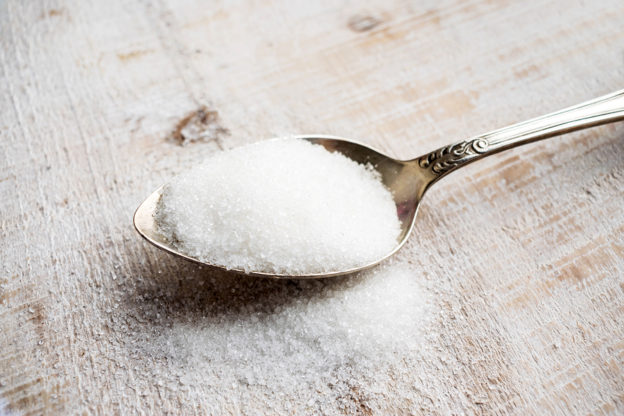By David Blyweiss, M.D., Advanced Natural Wellness
October 10, 2018
- Sugar free isn’t always your healthiest choice
- Why you should never use artificial sweeteners
- The best sugar substitute on earth
There are plenty of places to lay blame for today’s epidemic of obesity and diabetes. And most of them boil down to lifestyle choices.
However, there is one thing that I believe is greatly adding fuel to the problem. It’s a common decision that millions of people make every day in the name of good health.
It’s the conscious choice to opt for artificially sweetened foods and beverages.
Let me explain…
In most cases, folks choose sugar substitutes specifically to combat weight concerns and diabetes. And while it sounds good in theory, it’s a huge mistake. In fact, it could actually be destroying your health.
You see, despite popular belief, artificial sweeteners don’t aid weight loss. Nor do they protect against diabetes. Rather, they actually contribute to a larger waistline, increased weight gain and a higher incidence of obesity.
To top it off, these no and low calorie sweeteners also alter glucose response. This, of course, increases your risk of metabolic syndrome and type 2 diabetes.
MD Exposes the Hidden Danger to Your Eyes

When your eyesight starts to fail, it's a real problem. Suddenly you can't go to the grocery store... you can't get to the doctor if you have an emergency... you can't meet your friends for dinner…
Your "regular" doctor doesn't have time to keep up with the latest research. And the same goes for eye doctors. They go to school to learn how to fit you for glasses and contacts, but have no way of preventing the damage and loss of eyesight that threatens your freedom and independence.
Let me show you something that explains a LOT about how your eyes work.
In my FREE Special Report, I'll show you a HUGE, untapped resource for your eyes that safely and naturally restores clear, effortless eyesight.
Click here to get started...
My patients are often surprised to hear this. And I have to admit. The way that non-caloric sweeteners have been marketed over the years makes it a hard concept to wrap your mind around.
Why I Never Recommend Using Artificial Sweeteners
One of the big problems with sugar substitutes is that they alter your gut microbiome. They reduce the number of good microbes and increase the population of others that have a negative effect on your metabolism. This can lead to abnormally high blood sugar levels.
To make matters even worse, the overgrowth of these unhealthy microbes can wreak havoc on your weight. They’re pre-programmed to turn energy into fat. This, of course, increases your fat stores. And you know as well as I do that this is exactly the opposite of what you want to have happen.
But that’s not the extent of the problem. These sweeteners can also cause a rapid release of leptin. This is the hormone that sends satiety signals to the brain when you’re full. But when you consistently produce excess amounts of leptin, your body will eventually become resistant to it.
This means the hormone that regulates your appetite ends up racing out of control and “forgets” how to do its job. This makes you feel hungry all the time.
As if all of that isn’t bad enough, today we’re learning this isn’t the extent of the damage.
For example, it’s always been believed that Splenda (sucralose) passes through your body totally intact. That it doesn’t metabolize. But now we’ve discovered this was an incorrect assessment.
As it turns out, Splenda produces two specific metabolites during digestion that are stored in fatty tissue. While the consequences of this are unclear, one thing is certain. It’s extremely likely that these metabolites are going to stick around in your fat cells for awhile, even if you stop using Splenda. And it’s never a good idea to have foreign substances taking up residence in fat cells.
Another concern with Splenda is its use in baked and other foods cooked at high temperatures. You see, when it’s exposed to heat, it generates chloropropanols. These potentially toxic compounds are associated with the development of cancers and tumors.
Are You Suffering From...
- Love handles and a pot belly
- Romance that isn't what it used to
- Forgetfulness and inattention
- Low (or no) strength and endurance
- A sex drive that's shifted into neutral...or worse
If so...you may have Mature Male Burnout. Click here to discover more about this unique condition and what you can do about it.
But Splenda isn’t the only sugar substitute you should be concerned about.
The great majority of them are also considered “neuroexcitotoxins”. They overstimulate neuron receptors which, over time, destroys brain cells.
This over-excitement can cause headaches, insomnia, seizures and other neurological side effects. It can also lead to serious health problems such as multiple sclerosis, Alzheimer’s disease and Parkinson’s disease.
The Best Sugar Substitute of All
It’s easy to reach for foods labeled “diet”, “sugar free” or “low calorie” thinking that they’ll help control your weight and blood sugar. But the truth is, these terms usually mean they’re loaded with artificial sweeteners.
So before buying foods with these types of claims on their labels, check the fine print on the ingredient label. If it contains any type of fake sweetener, put it back on the shelf.
And what about adding a little sweetness to your foods and beverages at home?
I recommend giving up those pink, yellow and blue packets of poison and switching to stevia. It’s a safe, calorie-free sweetener that doesn’t carry any of the risks you find with refined sugar or artificial sweeteners.
As an added bonus, stevia reduces after-meal glucose and insulin response. This means that, unlike sugar and sugar substitutes, it has a positive effect on your metabolism.
And one more thing…
The popular sweetener Truvia is not a natural stevia product. Its main ingredient is erythritol, a sugar alcohol that’s made from genetically altered corn. And it’s not good for you. Look for the natural stevia as your go to sweetener.
SOURCES:
Fagherazzi G, et al. Chronic Consumption of Artificial Sweetener in Packets or Tablets and Type 2 Diabetes Risk: Evidence from the E3N-European Prospective Investigation into Cancer and Nutrition Study. Ann Nutr Metab. 2017;70(1):51-58.
Azad MB, et a. Nonnutritive sweeteners and cardiometabolic health: a systematic review and meta-analysis of randomized controlled trials and prospective cohort studies. CMAJ. 2017 Jul 17; 189(28): E929–E939.
Suez J, et al. Artificial sweeteners induce glucose intolerance by altering the gut microbiota.Nature. 2014 Oct 9;514(7521):181-6.
Study Finds Sucralose Produces Previously Unidentified Metabolites. Press Release. North Carolina State University. Aug 2018.
Bornemann V, et al. Intestinal Metabolism and Bioaccumulation of Sucralose In Adipose Tissue In The Rat. J Toxicol Environ Health A. 2018 Aug 21:1-11.
Schiffman SS, et al. Sucralose, A Synthetic Organochlorine Sweetener: Overview of Biological Issues. J Toxicol Environ Health B Crit Rev. 2013 Sep; 16(7): 399–451.
Humphries P, et al. Direct and indirect cellular effects of aspartame on the brain. Eur J Clin Nutr. 2008 Apr;62(4):451-62.
Anton SD, et al. Effects of stevia, aspartame, and sucrose on food intake, satiety, and postprandial glucose and insulin levels. Appetite. 2010 Aug;55(1):37-43.







